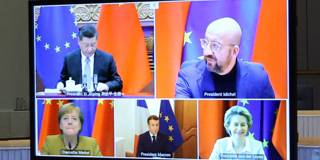With the completion of a major investment treaty between the European Union and China, the new year will begin on a promising footing. Now is the time for the world's leading powers to stop casting stones from glass houses, and start coming together to end the pandemic and set the stage for a green, digital global recovery.
NEW YORK – Kudos to the European Commission for finalizing a new investment agreement with China. Europe’s active diplomacy also played a role in China’s recent commitment to achieve carbon neutrality by 2060 – a decision that was quickly followed by Japan’s pledge to decarbonize by 2050. Now it has yielded yet another major success.
The new EU-China investment agreement will benefit Europe, China, the world, and even the United States, despite the latter’s warnings against it. In general terms, the agreement signifies the intention of the EU and China to continue to deepen economic relations, by granting each party more assured access for investments in the other’s economy. European industry will gain better access to China’s enormous domestic market just as China embarks on a decade of green and digital economic restructuring, and at a time when Europe is striving to stay at the technological forefront in these areas.
The agreement comes in the face of deeply misguided – indeed, dangerous – attempts by US President Donald Trump’s administration not only to cut economic ties with China in high-tech industries, but also to contain China’s growth by forging a US-led alliance that Trump hoped would be backed by the EU and Asia-Pacific countries, including Australia, India, Japan, and South Korea. It appears that the incoming Biden administration may well lean in the same direction, though certainly with more finesse and less bombast than Trump.

NEW YORK – Kudos to the European Commission for finalizing a new investment agreement with China. Europe’s active diplomacy also played a role in China’s recent commitment to achieve carbon neutrality by 2060 – a decision that was quickly followed by Japan’s pledge to decarbonize by 2050. Now it has yielded yet another major success.
The new EU-China investment agreement will benefit Europe, China, the world, and even the United States, despite the latter’s warnings against it. In general terms, the agreement signifies the intention of the EU and China to continue to deepen economic relations, by granting each party more assured access for investments in the other’s economy. European industry will gain better access to China’s enormous domestic market just as China embarks on a decade of green and digital economic restructuring, and at a time when Europe is striving to stay at the technological forefront in these areas.
The agreement comes in the face of deeply misguided – indeed, dangerous – attempts by US President Donald Trump’s administration not only to cut economic ties with China in high-tech industries, but also to contain China’s growth by forging a US-led alliance that Trump hoped would be backed by the EU and Asia-Pacific countries, including Australia, India, Japan, and South Korea. It appears that the incoming Biden administration may well lean in the same direction, though certainly with more finesse and less bombast than Trump.